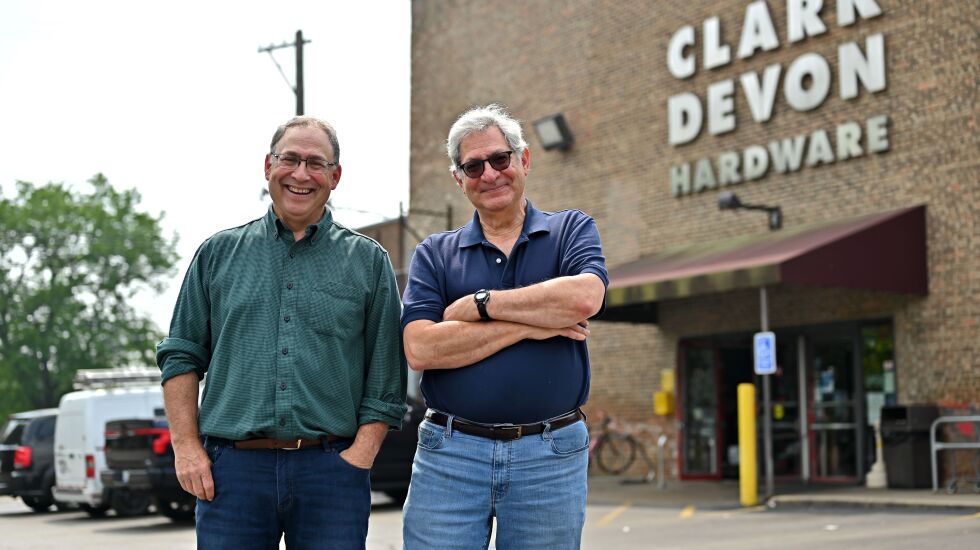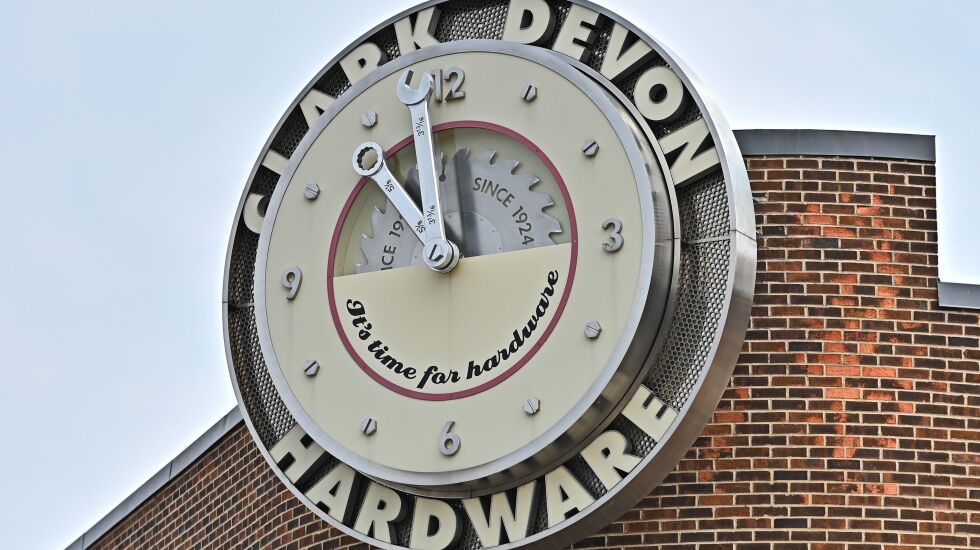
Clark-Devon Hardware is one of those throwback places that you hope will never change with the times.
Walk into the store that has prospered under family ownership for 99 years and you notice the worn wood of the floors, the shelves with merchandise piled toward the ceiling, the employees who move about quickly and with purpose but are not too busy to ask if you need help. Conversations about a project might end with, “Buy this. You don’t need that other thing.”
Clark-Devon is one of the biggest independent hardware stores in the region. It has about 65 employees and they mostly stick around, building up years of service. It’s named for the intersection of Clark Street and Devon Avenue where it sits, a reassuring presence for homeowners needing to fix something in Rogers Park, Edgewater and points beyond. People remember the store’s “hardware clock” on the corner, with hands in the style of wrenches.
Former co-owners Ed and Ken Walchak thought about their workers when contemplating what must come next. “We’re both of that age …” Ed Walchak said. The brothers said they had gotten offers for the store over the years but nothing “felt right.” Then they settled on an option that did. It’s supposed to keep the store dispensing every conceivable screw and faucet part with advice on the side for years to come.
It’s an employee stock ownership plan, or ESOP. The Walchak brothers have sold the store to the employees, taking part of their payout in cash and the rest in loan repayments. If business grows, as it has steadily for years, the workers benefit.
For the Walchaks, it’s a way to bow out while ensuring continuity of a business they’ve run for 50 years, picking up from their father and grandfather. It’s as if the workers have become the fourth-generation owners.
“The great thing is that employees are getting ownership at no cost to them,” Ken Walchak said.
About 70% of the store’s business is with property management firms. “We like to call ourselves ‘Janitors R Us,’” Ken Walchak said.
The key to success, Ed Walchak said, is “you get yourself a niche and you work that niche.” He said the ESOP was a good idea, in part, because the store has a deep base of employees who have advanced on merit. The new CEO is Xan Flink, who said he started there 15 years ago as a cashier knowing nothing about hardware.
“A lot of business owners keep things to themselves and don’t develop new leadership,” Ed Walchak said. “They end up with a business that cannot survive them.”
The brothers chatted last week in their final days of full-time hours at the store, sitting in snug offices one flight up from the main floor. The grinding of the key cutting machine is their background music.
Both expect to bop in frequently and they are on the ESOP’s board. But they said they’re looking forward to the next chapter. Ed, 66, has a second grandchild coming and a golf game to work on. Ken, 70, is an architect and president of the Rogers Park/West Ridge Historical Society. He said he wants to promote historic preservation.
More than the 15,000-square-foot store, the employees are taking over a small business compound. Nearby, Clark-Devon has sites where workers repair lawn mowers and snow blowers and another for fixing windows.
ESOPs don’t have a great reputation in these parts. Sam Zell created one to take over the Chicago Tribune but it collapsed from oppressive debt. United Airlines scrapped one that couldn’t stop labor trouble because most employees didn’t have a cut of the action.
But many see ESOPs as attractive for small to mid-sized firms that have strong cash flow, a good management team and ownership that wants to exit while preserving their company’s culture.
Matt Nels, managing director at Evanston-based Menke & Associates, is a leading expert in ESOPs and handled the Clark-Devon transaction. He said the hardware store should be able to pay money owed the Walchaks in a few years.
The National Center for Employee Ownership said there are 6,467 ESOPs in the United States. It said Illinois has 283, collectively with more than $10 billion in plan assets.
Nels said ESOPs may be appropriate for companies with at least 15 to 20 employees. The process has tax benefits but also entails costs. “It’s not a solution for every business,” he said. “But it should be on the table as an alternative. There are a lot of baby boomers with companies out there who are looking to retire.”








